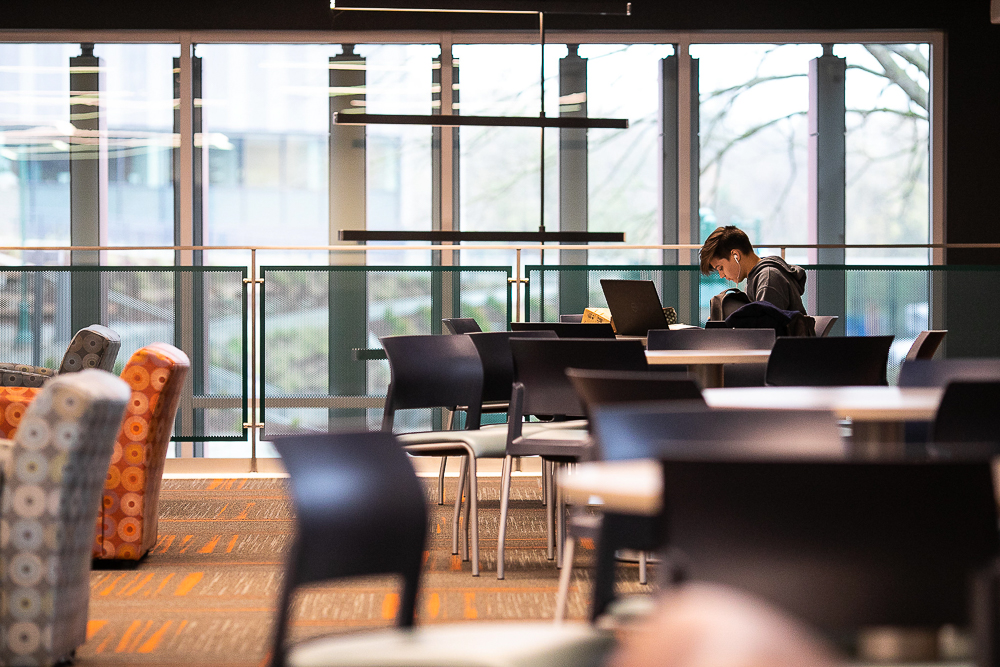 A new Sacramento State survey provides insights about the impact of distance learning on students. (Sacramento State/Andrea Price)
A new Sacramento State survey provides insights about the impact of distance learning on students. (Sacramento State/Andrea Price)
By Dixie Reid
After Sacramento State shifted to distance learning in March because of COVID-19, Ethan Evans and his colleagues in the Division of Social Work wondered about that change's ramifications to their students.
For instance, would Social Work students want to continue their studies this fall if classes were online only? Did students feel that they learned less after classes went virtual? Had their mental health or financial security suffered because of the pandemic?
“Social Work is a unique profession. Students are trained through accredited course curriculum and field practice to work with individuals, families, and communities, often during crises,” said Evans, assistant professor of Social Work. “We each had heard from individual students about the impact of the shift to online education and their impressions, but we had nothing systematic.”
Evans and other Social Work faculty, including Stacey Ault, Kyle Caler, Kisun Nam, and Sarah Reed, wanted to hear from students as they made plans to teach online this fall.
So they devised a survey that soon found an audience not just with their students, but also with thousands of Social Work students throughout the country.
“In designing the research protocol for institutional review,” Evans said, “we realized that other Social Work departments could benefit from hearing from their students. So we partnered with the Council on Social Work Education (CSWE) to get our study out to as many schools of Social Work and their students as possible.”
The Sac State-designed survey was completed by 3,554 students representing 151 colleges and universities in 44 states, the District of Columbia, and Puerto Rico.
“We appreciate the partnership with Sacramento State’s team to produce this information and will continue to support students, faculty, and programs deliver safe and quality social work education,” said Darla Spence Coffey, CSWE president and CEO.
The researchers have not yet completed analysis of data specific to the CSU campuses, including Sacramento State. However, they have released a research brief through CSWE.
Some results of the national aggregate data:
- If classes were offered only online in fall 2020, 10.7 percent of respondents said they would not enroll.
- Even if in-person classes were offered this fall, 5.8 percent said they would not enroll.
- Of the respondents required to complete a field-placement experience this fall, 68 percent would prefer to do it in person; 21.5 percent prefer that it not be in person; and 8.4 percent prefer to postpone until spring 2021, awaiting more information.
- Of respondents who had classes shift to online, 80.8 percent did not prefer online delivery to in-person instruction.
- Most students — 61.1 percent — felt that they learned less during the Spring 2020 semester after classes were moved online. Of those 1,633 respondents, 64.8 percent said they learned approximately 40 percent less.
- As for how the campus closures and shift to online learning affected them personally, 64.6 percent of respondents said they had experienced “some” (37.1 percent) or “very much” (27.5 percent) disruption to their financial security.
Nearly 81 percent said their mental health was adversely affected by the pandemic, with 33.2 percent saying it had been “very much” affected.
“These findings can be used by Social Work department administrators to help guide their decisions about fall classes,” Evans said. “It also can be used by the University to better understand the adverse impact that our students have experienced due to the pandemic and the shift to distance learning.
“And our students also can see how their own experiences and goals compare with other Social Work students nationwide.”
